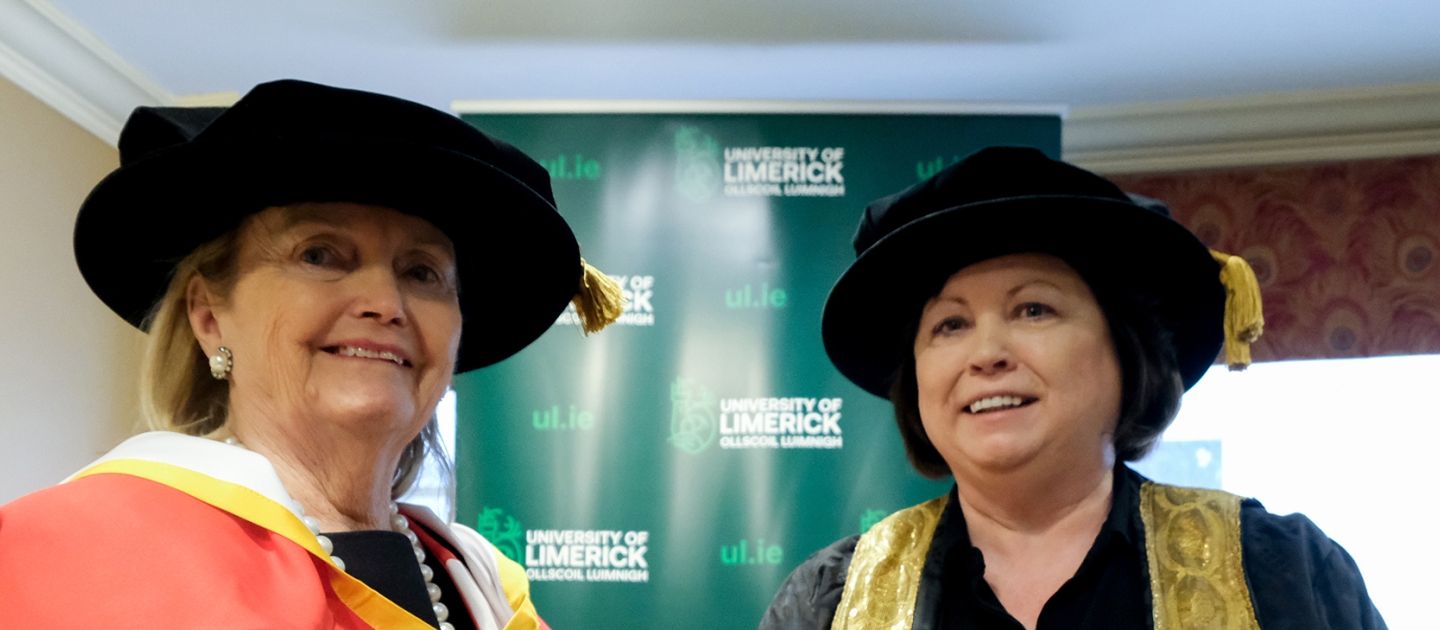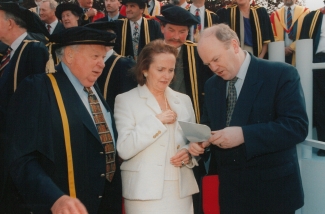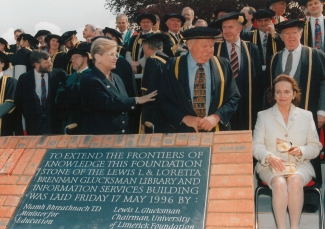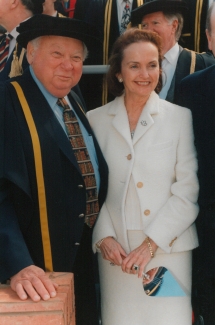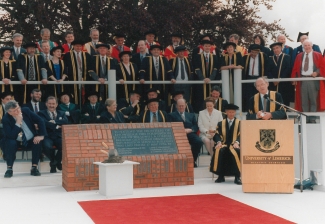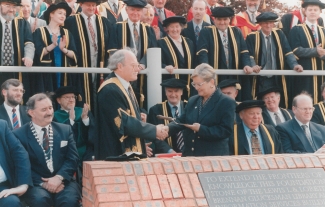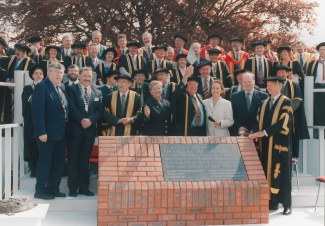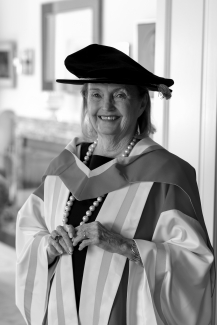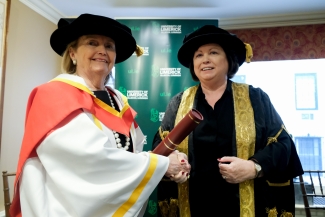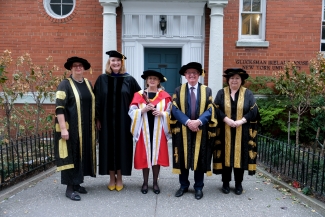‘A magical association with an amazing university’ Dr Niamh NicGhabhann speaks to Loretta Brennan Glucksman, outgoing chair of the University of Limerick Foundation
I read, I write, therefore all life is near.
These are the closing lines of the double sonnet ‘In the Library’ by Mary O’Malley and Martin Dyar, which was commissioned to mark the opening of the Glucksman Library extension at University of Limerick in summer 2018.
Those present will remember the day – the sunlight streaming in through the glass, the necessary pomp and circumstance of speeches and unveilings, and the genuine admiration and excitement of all present at the exciting new spaces for learning, reading, thinking, collaboration, conversation and contemplation.
The Glucksman Library has long been at the heart of life at UL, from the warm welcome of the café staff to the expert help and support of the librarians and assistants.
With the extension, that heart got bigger, and was welcomed by all.
Now, in late 2020, as we read and write without ‘all life’ being quite so near, the memory of such an event is coloured by a certain nostalgia. However, that heart is still beating, and the Glucksman Library is working harder than ever to connect staff and students with the ideas and supports that they need, whether they are working on campus or from kitchen tables and bedside desks around the world.
The decision to invest in a university library is a decision to invest in transformation. By all accounts, it is one of the most enduring investments in transformation that could be made – one thinks of the decisions of Sir Thomas Bodley at Oxford, or of Archbishop Narcissus Marsh in Dublin, which have continued to support transformative learning and scholarship throughout the centuries.
While we can no longer sit down and chat to Bodley or Marsh about their experiences and insights, I was lucky enough to be able to have a conversation with someone with first-hand experience of transformation within the university sector – Dr Loretta Brennan Glucksman.
Dr Brennan Glucksman will be well-known to many as Chair of the Board of the UL Foundation, and through her life’s work in philanthropy, often focused on establishing strong ties between America and Ireland. We met via Skype, and had a wonderful and wide-ranging conversation for over an hour, and some of this is captured below.
Niamh NicGhabhann (NNiG): Before we begin, I should say my parents met at the University of Limerick so I feel very indebted to UL for existing at all!
Loretta Brennan Glucksman (LBG): You are really a UL girl!
NNiG: I would love to tap into some of your insight and expertise around transformation and education. You and your late husband have made, and you continue to make, such an enormous contribution to Irish educational and cultural institutions. I want to ask first of all, why have culture and education been such a focus of your work over the past years?
LBG: That’s a good and very big question. The University of Limerick was the first university that Lew and I visited in the 1980s on a tour of Ireland. Lew was a trustee at NYU, and he was concerned because there were a lot of ethnic study houses at NYU. There were Greek studies, Jewish studies, Spanish studies, French, German, the whole gamut, but there was no centre for Irish studies. Now Lew was a Hungarian Jew, so he had no Irish ethnicity, but that didn’t hold him back and I of course was third generation Irish. Both sides of my grandparents came over to the United States from Ireland, so I was deeply embedded in my Irishness. We decided that we would go to Ireland and see if there would be any interest in the academic centres in Ireland for any sort of exchange programs. We went in June 1984, and indeed there was interest. Divine providence, I call I it – we flew into Shannon, and came upon the University of Limerick. Dr Ed Walsh was our wonderful President at that time, and he welcomed us very warmly. That was the beginning of our magical association with an amazing university.
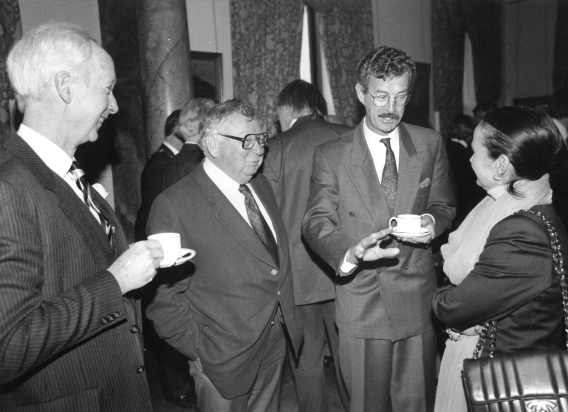
Picture credit: UL Library Special Collections Archive
NNiG: As someone who grew up in the vicinity, UL always had that sense of being light on its feet, and being ready to be reactive and responsive to opportunities so it’s interesting that you came across them and they came across you, and the rest is history. Putting this in an historical perspective, Irish education seems to move forward in great leaps. For example, the introduction of free second level education was something that opened up horizons for people. It’s quite extraordinary when you think about the lives that have been changed and the whole families and generations that have been changed by that policy decision. I think that the massive investment in third level education in the 1990s was equally transformative. From your perspective as someone who looks at transformational change and what needs to be put where for transformation to happen, what do you think the next big transformative change is that we need to see happening in terms of the Irish educational landscape?
LBG: I am very focused, for the obvious reasons, on healthcare and it is part of the educational system per se. I think we all have been impacted, indeed changed, by the pandemic. That’s not the only reason that I say healthcare, but it certainly has writ large the urgency that I had been seeing before of the necessity to have a more democratic access to overall healthcare for everyone. Access to healthcare that is not tied to your place in society or your ability to pay is something that has been on my mind a great deal and that’s what I’m really putting efforts into right now. Indeed, at UL we’ve been talking a lot at the Foundation about how to assist the coming wave of new facilities, new aspects to provide the education that going to be necessary for the huge number of professionals that will be needed in the coming days, post pandemic and going forward.
NNiG: In the university system, we offer students the opportunity to spend time thinking about the kind of person they want to be and the kind of impact they want to make, and I think the opportunities that places like the Glucksman and also many environments in the University of Limerick and other universities are central, because the students are not just boxes we’re filling up with knowledge but citizens of the world that we are hopefully enabling in the best ways that we can. Can you talk about your sense of Limerick as a city, and its connections with the University?
LBG: I just love Limerick city. I’ve had a chance to work with wonderful people, including Denis Brosnan, Conn Murray, John Moran, Don Barry, Rose Hynes and others on how to best bridge the moat between town and gown, and have some of the successful aspects of the University and our wonderful Campus benefit the city. Geographically, they are so close, so lots of wonderful experiments and suggestions were given and a lot of them were acted upon. I know Mary Harney, our wonderful Chancellor, is very intent on that, as are many of our members of the Foundation and business people in the area, including the leaders of Shannon Airport.
It is a vision shared by Harry Fehily, into whose exceptionally capable hands I pass the Foundation’s Chairmanship.
And one more thing - I wanted very much in this conversation with you to mention Chuck Feeney. He has just attained his goal of giving away all his money, $8 billion dollars and Ireland and the University of Limerick have been recipients of that amazing generosity for years, going back to Ed Walsh. Chuck Feeney is a historical figure and I’m so happy that he found Limerick. He came and he changed the world for so many Irish students and indeed for the country of Ireland, so thank you Chuck.
NNiG: Absolutely, and I think for someone who grew up in Limerick and around UL, it was like magic to see it suddenly rise up. I will never forget walking into the Foundation building and to the Concert Hall for the first time and being brought to concerts there and just thinking this is so enormous, how did this arrive on my doorstep in Limerick?! I want to ask one final question. What are your hopes and dreams for UL going forward in the next 20 or 50 years, what do you hope the University of Limerick goes on to do and become?
LBG: Well, that’s one of those wonderful questions because it you can make it whatever size that you want, but I would like to hope that the University of Limerick is allowed to fulfil the mission that was perceived when a band of very eager, talented people got together and said this is necessary and it will be beneficial. I think paramount to that is being true to the vision of connecting the Library with the city, of being in the City and there are facets of the university all around you, of being on the campus and there are aspects of the City all around you and to have that flow.
I think that’s the first thing I would pray for in the future of the University and of the City of Limerick, that we realise that promise of melding the benefits of both to the strength of both and indeed to the alleviation of the problems of both. If that can happen, I think that would be the culmination of the dreams of so many wondrous people.
NNiG: Our time is up, but in the course of our conversation, you’ve mentioned many dinners and parties throughout your time in Ireland. I have to ask – what is your party piece?
LBG: I don’t have a terrific voice, but boy do I know the words! I have so many favourites I’m not even sure I could name one, Parting Glass comes to mind, and then I also like to use American songs like Yankee Doodle Dandy. My favourite story of a singsong is Lew who had no idea of tone to say the least and had no interest in it. His interest was in stories and facts so he came up with a party piece that he would challenge people to name the collective noun of a species so a Gaggle of Geese and a this of that, and it was so infectious.
NNiG: As long as everybody has their party piece, that’s always the main thing! It is lovely to end our interview remembering your late husband, because it’s very evident that all of the work brings his memory and his life with it too and we all very much remember and appreciate those efforts, and the thought and passion and time that your family has so generously given to our region and our university.
LBG: Niamh, we always feel, Lew and I, that we have always been by a huge margin the beneficiaries of our whole experience in Ireland. We have benefitted so beautifully and deeply from our experiences in that magical country from all the people and all the good that has come and will come so we always felt that the ledger was very, very stacked. We took more than we ever gave so that’s a lovely experience to have. I thank you so much for this, you ask very good questions that elicited so many wonderful memories so I thank you for that and I hope I get to meet you whenever God allows us to really be together again.
